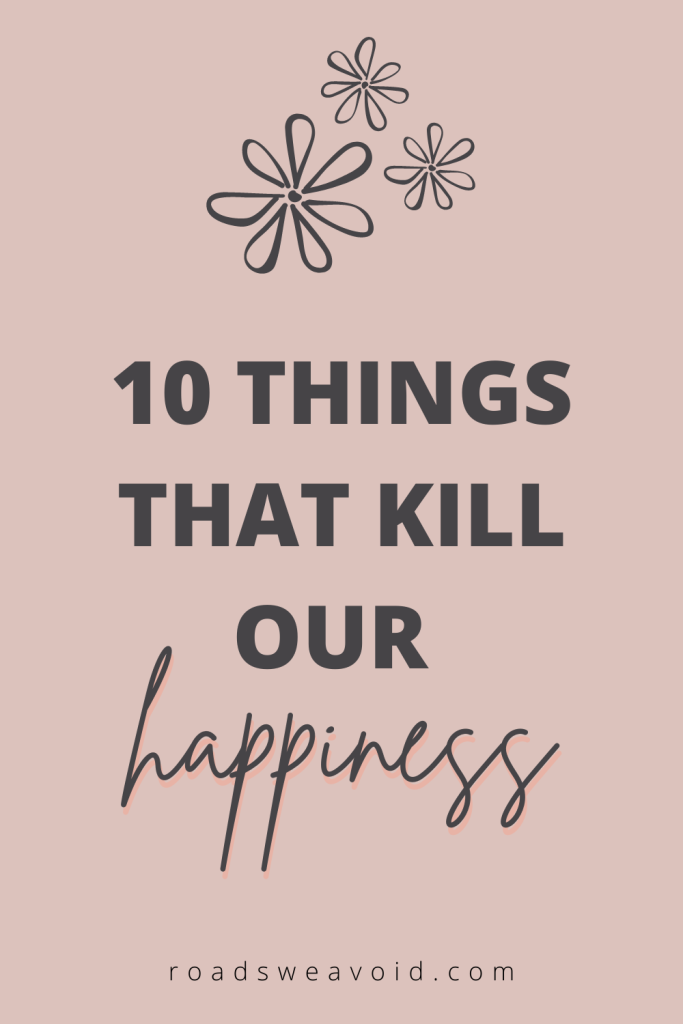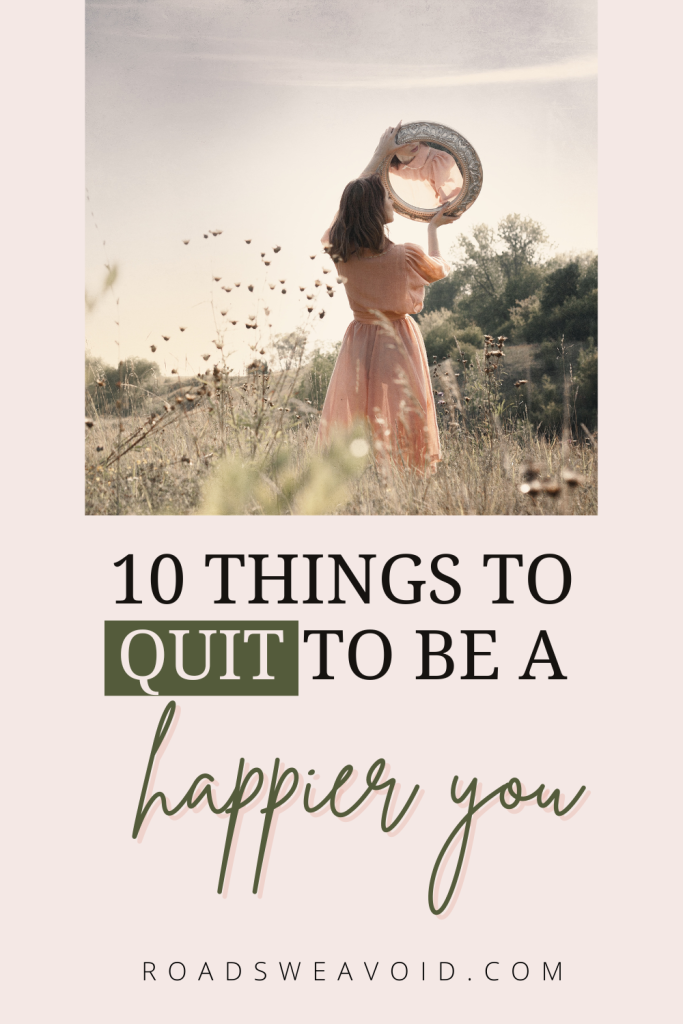The only person who can kill your happiness is you. Just remember that. We’re brought up taught that we’re not supposed to hurt someone’s heart. But something we are not taught is that we are not supposed to hurt our own hearts as well. And do we do that often? Yes! This is something I learned after a lot of pits and falls in life.
I was trying to do everything right in my book and still not achieving the mental peace I thought I deserved. I wasn’t happy, at least most of the time. Happiness is a concept we are still trying to understand. Some try to seek it in joy, relationships, entertainment, success, religion, philanthropy, hobbies, new things, money, and career. There are tons and tons of ideas around happiness out there. But for the purpose of this blog post, we are going to go through 10 things that kill your happiness.
Sneak Peek: There are two prevalent concepts out there regarding happiness. We discuss them in points number 9 and 10 respectively.
10 things that kill our own happiness
1. Being oversensitive
According to psychologists, we have somewhere around 27 groups of emotions that blend together in our everyday experiences. The prime purpose of these emotions is to help aid our thinking, not rule over it. It’s said we have two brains, an emotional brain, and a thinking brain.
The emotional side of your brain is always looking for comfort and reassurance. It will make you want to avoid difficult tasks that don’t give you any immediate reward. This side of the brain will hamper you from working out every day even though you bought a really pretty set of gym wear.
The rational side is perfect for long-term planning. It’s the perfect side for tackling difficult tasks until it starts overthinking when a task seems too complicated.
When we keep using our emotional side of the brain, we become oversensitive. Everything seems to trigger us. We have unresolved emotions harbored inside of us. This leads to long-term unhappiness as people start drifting away from you. You develop this energy-sucking attitude and radiate negativity everywhere you go. You lose relationships because you develop into this oversensitive mindset that needs everyone to take care of you while leaving you unable to do so for anyone else.
2. Being irate most of the time with most of your relationships
I don’t think everyone out there is there to hurt you or be a cause of your misery as much as you yourself are. If you find yourself annoyed or easily perturbed by multiple people around you, it’s either because you are not setting the right boundaries with them or are not respecting their boundaries.
We need to let people live. If we think they are in the wrong, the most you can do is communicate in a respectful manner that’s not demeaning or hurtful. Someone might still get hurt, that’s because they are not in control of their emotions. Similarly, when you are hurt by people’s comments or remarks about you or your life, it’s a sign you are dealing with self-esteem issues.
There are so many people in the world, how can you expect everyone to understand where you are coming from? And it’s okay, not everyone is going to understand you 100% of the time because that’s only natural. Different brains function differently. We can not be agitated over everything, that’s only going to hurt us more, the other person might not even feel that affected by your anger or by your being irate towards them.
3. Going through every situation emotionally
In any situation, if it’s causing certain emotions to trigger up negatively impacting you, then you are probably giving too much space to your emotions and too little to logic. Emotions can easily override logic and hamper you from making the right decisions in life.
While emotions are good at times, at others, if they override logic and rationale, can cause great distress not just in your life but in others as well.
4. Overthinking or going too deeply into situations
Remember not all concerns are your concerns. Not all worries are your worries. Not everything, or most of the things for that matter, will get resolved by you obsessing over it or thinking about them in a loop. Your overthinking brain will make a great deal out of a seemingly small occurrence in life. What’s a petty issue might start feeling like a life threat just because you let your mind wander in the alleys of negative thoughts inside yourself.
5. External locus of control
There are two types of people out there, ones who have an internal locus of control and others who have an external locus of control. What does that even mean?
Having an external locus of control essentially means your mental peace is greatly affected by external life events and people. They can outrage you, make you unhappy or make you smile and laugh. You put great emphasis on what’s happening around you to define your internal mental state.
On the other hand, having an internal locus of control means you are the guardian of your emotions. You don’t let the outside world dictate your feelings. You have very well-defined filters inside your mind that help you make sense of the world in a way that doesn’t disrupt your mental peace.
This concept is so important that once you start having an internal locus of control your happiness becomes a choice, more on this later. But for now, remember, things may happen to you but it’s up to you what you are going to make out of it. Is it going to be another pile of unresolved emotions or a lesson learned or an experience gained in life?
6. Suspicion/Evil Presumptions
Presumptions and suspicions are like burning a lump of coal. You hold them in your hands only to burn your own self. What you are thinking might not even be true. What’s the point of entertaining such thoughts in your mind then?
When your locus of control is internal, you don’t let external events or people control your emotions. You are the master of your own emotions and that’s your power.
7. Giving room to malice, hatred, grudge
When you give enough room to feelings and thoughts associated with malice, hatred, jealousy, or hold grudges against people who are you actually hurting? Believe me, that person will get hurt later you will first hurt yourself.
These feelings are heavy on our own souls. The other person might not even give you so much space in their mind but you, by harboring all these negative emotions actually disrupt your own peace and happiness.
When the mind is so busy catering to these negative thoughts and emotions, it has little real estate left for constructive or creative tasks. It has little room left to feel the actual beauty around you. Bear in mind, that the beauty around you is consistent but so is the negativity. It’s up to you which of these two energies you’re going to rent out your mental space to.
8. Not giving enough margin to people
When we don’t give people enough row in life and are ready to grab them by the neck at every mistake they make, we are setting our own hearts on fire. We need to learn to give people space. When to worry about something and to what extent requires experience and patience but knowing how important marginalizing is in life is the key.
9. Over expecting or under expecting
If you can understand one concept today, understand balance. Life is nowhere in the extremes, it’s somewhere in between. So is happiness. Some people expect too much out of others or themselves and when others or they themselves fall short of those expectations, their happiness suffers. Others thought that maybe if we expect nothing we’ll essentially be happier in life. And so you see quotes like:
‘When you have expectations, you are setting yourself up for disappointment.’ – Ryan Reynolds
or
‘If you expect nothing from somebody, you are never disappointed.’ – Sylvia Plath
or
‘Low expectations are a key to happiness in life.’ – Christopher Miller
And so you dig a hole in the ground and start keeping your bar of expectations way down in the earth. How realistic is that? Honestly, we humans were not made that way. When you are sick, you naturally expect your family to care as you would when they are sick. Yes, but setting unrealistic expectations from people around you may cost you your happiness.
So, we kill our happiness by either over-expecting or under-expecting people. But if we keep our bar somewhere in the middle by setting realistic expectations and keeping the locus of control to ourselves, we are in a better position of attracting happiness in life.
Do remember, sometimes even your realistic expectations might not be met. You need to be content with that.
10. Being over-ambitious or under-ambitious
Another thing we’ve grown up believing is that success is more important than happiness or that happiness leads to success. Money can buy happiness or having so and so much will make you a happier person. True but only to a certain extent. Again it’s all about balance in the end.
Having too many ambitions or great targets in life will make you want to achieve them and then feel happy. You see you are putting your happiness, again, outside yourself. You limit the idea of happiness by putting it at the top of a goal. Happiness is not so much in the achievement as it is in the journey.
Here’s what you can do about it:
a. Happiness is a choice
But absolute happiness is not a choice. Be okay with the fact that no one, not even you, can be happy all the time. Sometimes life will come in between. While you may have a choice in situations, for instance, when you don’t get your favorite coffee on your way to work, you may not have a choice in life’s dark realities like when going through abuse. But what you will always have is a choice to be a little bit better than your current state. And bit by bit you can achieve what you otherwise think is impossible.
b. You have to believe in it
Many of us out there don’t believe that happiness can be an inside job. We have either placed our locus of control externally or keep telling ourselves happiness is just not for us. It is for everyone and anyone out there. It’s a mindset. It’s not in one, two, or three things, it’s in a multitude of things. It’s hidden here and there in life. It’s lying around for you to pick and embrace.
c. Strive to be a better version of yourself
When you focus on the little things in life, like contentment, satisfaction, gratitude, the feeling of having enough, the feeling of not being in a miserable situation, the feeling of being healthy, eating good food, breathing fresh air, being able to walk, talk, think and just live the experience called life, you’re pouring a gallon of positive energies inside your every time you do it. It will help but you have to intrinsically feel the feeling.
Pin for Later!







